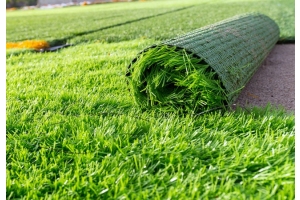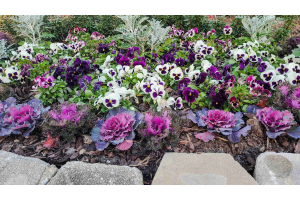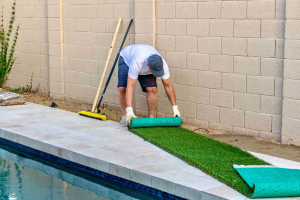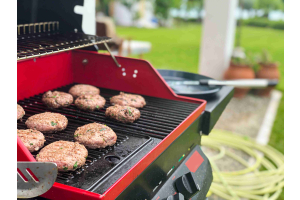
Cleaning artificial grass can be something that a lot of people forget about, once it's been installed. To prevent this, we have put together a collection of things that need to be considered when cleaning fake grass. We will go over the topics of how to clean fake grass, artificial grass maintenance, and what tools to use to keep the process effortless. We’ll also look into the best practice for looking after your turf for pet owners, as well as treating weeds in fake grass, too.
Quick Links
Cleaning Artificial Grass
Weekly Clean
Whilst Artificial Grass is low maintenance, you will need to pick up any loose dirt or debris. As a rule of thumb, we advise checking your grass on a weekly basis.
Any debris should be instantly visible, such as dead leaves or excess mud. Simply rake or brush these away with a soft-headed brush, so that they don't become intertwined with the grass blades or play havoc with your drainage system.
Monthly Clean
Lots of people turn to home remedies such as mixing 50% water and 50% vinegar to clean artificial grass. However, the smell of vinegar is not always favoured and can actually be quite off-putting.
Using Artificial Grass Cleaner kills bacteria and prevents anything from growing on the turf, whilst leaving your grass smelling great. As a specialist treatment, you can rest assured that it is child and pet-friendly too. Simply apply as per the manufacturer's instructions and rinse down after use - easy peasy!
Some artificial grass ranges can require a sand infill. This will depend on the pile height of your grass, and the positioning of the blades. If your blades are looking a little flat, simply brush them back and top them up with a layer of infill.
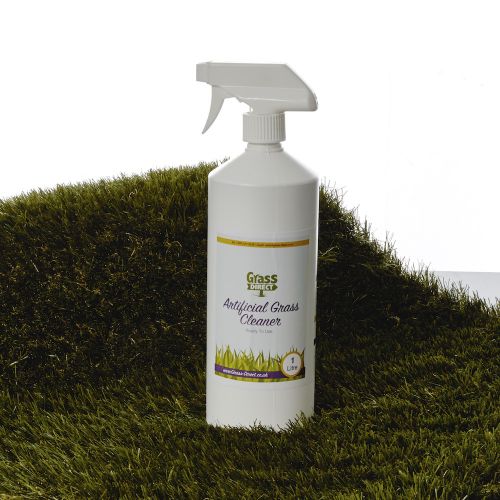
Ongoing Artificial Grass Maintenance
Accidents can happen but being proactive will prevent any lasting damage. Be sure to repair any seams, tears and holes as soon as you spot them. This will keep your garden looking great and prolong the lifespan of your artificial grass.
Always be sure to clean up debris that shouldn't be there, this keeps your grass looking brand new and well cared for. This also helps further down the line when debris might be harder to rake up, if you have neglected the grass for a long period of time.
Cleaning Dirt and Debris
Use a soft rake or a brush to gather up the debris that had made its way into your grass. Be sure to take care when using the rake, excess force can cause unintentional damage. For stubborn dirt, our Artificial Grass Cleaner is great for removing those tougher spots in your grass that a rake or brush can't get to.
If there are any sticky bits of debris such as gum or sweets, use a sharp knife and scrape them off gently. Follow the grass upwards with your knife to not accidentally cut some of the blades.
Cleaning Drinks and Spillages
To get rid of a liquid stain in your grass, use a damp cloth or paper towel and blot the stain directly, make sure not to rub the grass. If the stain is a little harder to remove, mix a tablespoon of water with a pint of detergent and soak your cloth in it. Then blot the stain using the same method.
Once the stain is removed, you can use a hose or a bit of water to rinse any detergent off your grass.
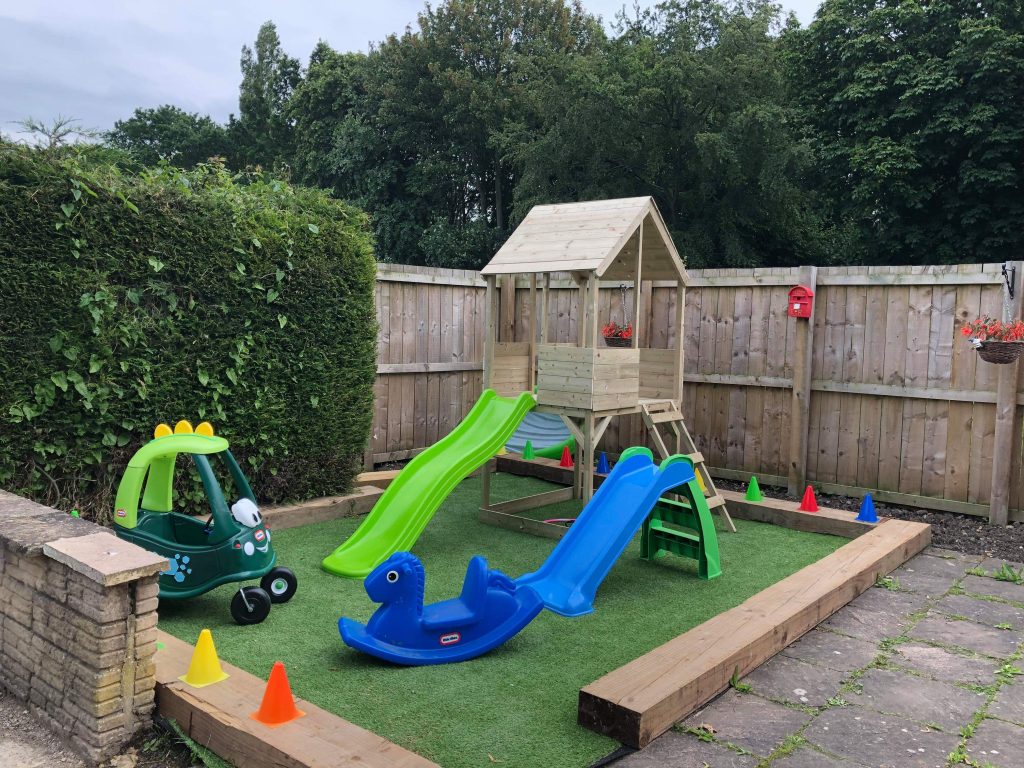
Cleaning Fake Grass after Pets
As previously mentioned, it is always best to clean your grass once a month using Artificial Grass Cleaner. This will keep your grass smelling clean as well as keeping it in great condition.
Cleaning fake grass after pets can vary depending on the number of pets you have. You may want to clean your grass more often to avoid the build-up of odour. Incorrect drainage is the root of many pet-related issues. No one likes the smell of urine, so make sure your grass has been fitted in the correct way in order for the turf to drain properly. Blocked systems cause the liquid to lie stagnant. Testing your drainage before and after installing will avoid the issue.
There are many myths associated with keeping artificial grass clean of pet urine, such as using sand to soak it up or white vinegar to neutralise the smell. In reality, these methods do not work. Check out our How to Get Rid of the Smell of Dog Urine from Artificial Grass blog to find out why these cleaning methods don't work.
If your pet sheds often, it is important to rake or brush the grass regularly. This will get rid of excess hair and prevent it from blocking your drainage system. The fine hair gets into the backing holes and can cause drainage problems, but a simple 5-minute job can solve those problems.
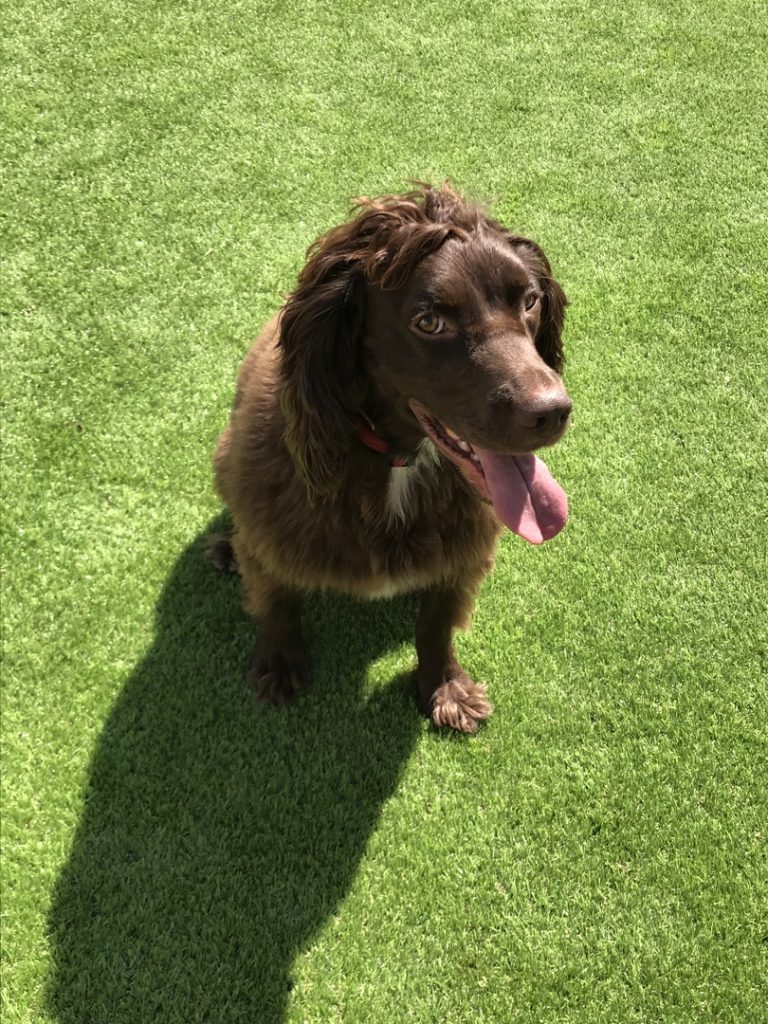
Dealing with Snow and Ice on Artificial Grass
Salt leftover from ice and snow can form a layer over the grass, preventing the turf from draining properly. It's important to know the correct method for cleaning fake grass. Use a plastic snow shovel to remove as much snow as possible from the turf. Be sure to not use a metal snow shovel or git, as this can damage the grass.
Your artificial lawn will not be damaged by frost, this is because the fibres we use are extremely strong and flexible, ensuring they don't snap when in cold weather. The grass itself is manufactured using polyethylene and polypropylene which are highly durable plastic materials, designed to withstand a lot of force.
Preventing Weeds in Artificial Grass
Weeds are homeowners nightmare. Whether you're a green-fingered garden lover or prefer to titivate up the garden now and then - weeds are a common irritant and can be pesky to deal with.
It is important, when installing artificial grass, to apply weed killer to the ground before you lay your grass. We supply a Weed Suppressant Membrane that has the necessary structure to prevent weeds from growing through the grass. This is placed underneath the turf to create a barrier and prevent the weeds from penetrating through the turf.
Make sure the area you are laying the grass over is completely clean and ready to go. If you are laying your grass over dirt, make sure there are no plants or patches of grass left over. For surfaces such as concrete or decking, ensure that the surface is completely clean and dry. This will give you the best results.
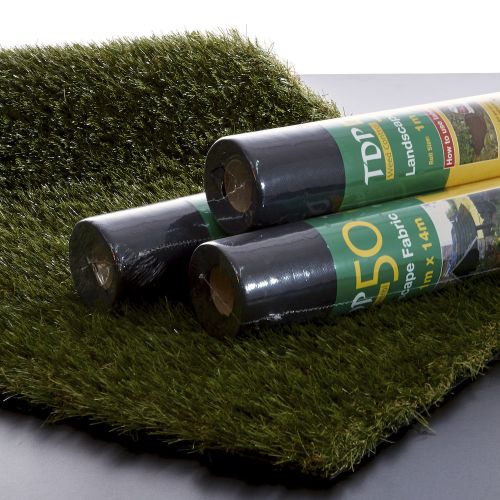
Treating Weeds in Fake Grass
Autumn months are renown for the falling of leaves and unpredictable weather conditions, creating the perfect temperature for shrubs, weeds, moss and mould to thrive. Treating weeds in fake grass is quick and easy in our 5 simple steps. When it comes to weeds, we'd advise starting by gently pulling out any surface weeds you can clearly see. This will make the following steps more effective:
- Rinse Down - Power washing your artificial grass will blast off any excess moss or mould before treating the area. If any stubborn weeds persist, use the back of your rake (teeth pointing away from the grass) to tease these out.
- Apply Treatment - Artificial Grass Cleaner is perfect for treating your grass. The biodegradable solution is environmentally-friendly and really effective at maintaining artificial grass, treating moss and mould issues. For weeds, a gentle weed killer is also suffice.
- Brush Down - Using a soft headed brush, gently scrub away any remaining weeds, moss or mould.
- Rinse Away - Hose down to rinse away any excess and leave to dry out.
For more information on how to manage moss, mould or treat weeds in fake grass, check out our blog "How to treat Mould or Moss on Artificial Grass".
Conclusion
Artificial grass is simple and easy to clean, in fact, it is less time consuming and laborious than caring for real grass. As long as you maintain your grass regularly, ensuring you clean up after spills, pets and are treating weeds in your fake grass, there will be no problems with its appearance, texture or smell.
Now you know artificial grass maintenance isn't a demanding task, start your transformation today! Alternatively, if you still have questions you need answering, get in touch with one of our artificial grass experts, and they'll be happy to help.







